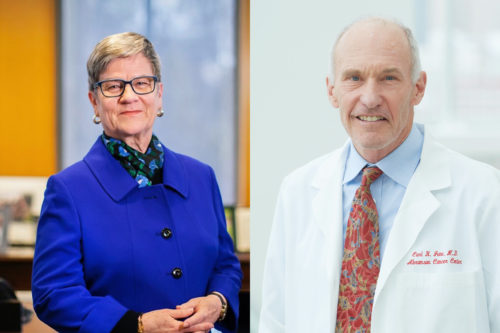Kathleen Hall Jamieson, director of the Annenberg Public Policy Center and a professor in the Annenberg School for Communication, was elected on Monday to the newest class of members of the National Academy of Sciences (NAS).
Jamieson was among the two University of Pennsylvania faculty named new members of the NAS. She was joined in that honor by Carl June, director of the Center for Cellular Immunotherapy in the Abramson Cancer Center at the Perelman School of Medicine.
The two Penn scholars join 120 members and 26 international members elected by their peers into NAS, recognized for “distinguished and continuing achievements in original research.” To date, there are 2,403 U.S. members of NAS and 501 international members.
Kathleen Hall Jamieson
In addition to her role as the Walter and Leonore Annenberg Director of the Annenberg Public Policy Center (APPC), Jamieson is the Elizabeth Ware Packard Professor of Communication at the Annenberg School for Communication and Program Director of the Annenberg Retreat at Sunnylands. Jamieson, a scholar of political and science communication, founded APPC in 1993 to educate the public and policymakers about the role of communication in advancing public understanding of political, health, and science issues at the state, local, and federal levels.

Jamieson has authored or co-authored 16 books, including “Cyberwar: How Russian Hackers and Trolls Helped Elect a President,” which won the 2019 R.R. Hawkins Award from the Association of American Publishers. In addition, six of the books that Jamieson has authored or co-authored have received a total of 12 political science or communication book awards (Cyberwar, Packaging the Presidency, Eloquence in an Electronic Age, Spiral of Cynicism, Presidents Creating the Presidency, and The Obama Victory). Her paper “Implications of the Demise of ‘Fact’ in Political Discourse” received the American Philosophical Society’s 2016 Henry Allen Moe Prize.
Separately, on Sunday the NAS awarded Jamieson its most prestigious award, the Public Welfare Medal, for her “non-partisan crusade to ensure the integrity of facts in public discourse and development of the science of scientific communication to promote public understanding of complex issues.” She is a fellow of the American Academy of Arts and Sciences, the American Philosophical Society, the American Academy of Political and Social Science, and the International Communication Association, and a past president of the American Academy of Political and Social Science.
Carl June
In addition to running the Center for Cellular Immunotherapy at the Abramson Cancer Center, June is the Richard W. Vague Professor in Immunotherapy in the department of Pathology and Laboratory Medicine at the Perelman School of Medicine and director of the Parker Institute for Cancer Immunotherapy at Penn. He is a pioneer in developing CAR T therapy, which became the nation’s first FDA-approved personalized cellular therapy for cancer in August 2017 and was approved for additional indications in 2018. Clinical trials of CAR T therapy began at Penn in 2010, and two of the first three patients to receive the therapy, for chronic lymphocytic leukemia (CLL), remain in remission. He also led the first U.S. trial involving CRISPR gene-edited immune cells to treat human cancer patients.
June has published more than 450 manuscripts and has received numerous prizes and honors, including being named to Time magazine’s list of the 100 most influential people in the world, election to the Institute of Medicine, the Paul Ehrlich and Ludwig Darmstaedter Prize, the William B. Coley Award, the Karl Landsteiner Memorial Award, the Richard V. Smalley Memorial Award from the Society for Immunotherapy of Cancer, the Philadelphia Award, the Hamdan Award for Medical Research Excellence, the Novartis Immunology Award for Cancer Cell Therapy Development, and the Albany Prize.
He was elected to the American Academy of Arts and Sciences in 2014. In 2017, he was named a fellow of the American Association for Cancer Research Academy and received the David A. Karnofsky Memorial Award from the American Society of Clinical Oncology.
Read Penn Today’s version of this news release.
The complete list of new NAS members is available on the Academy’s website.


